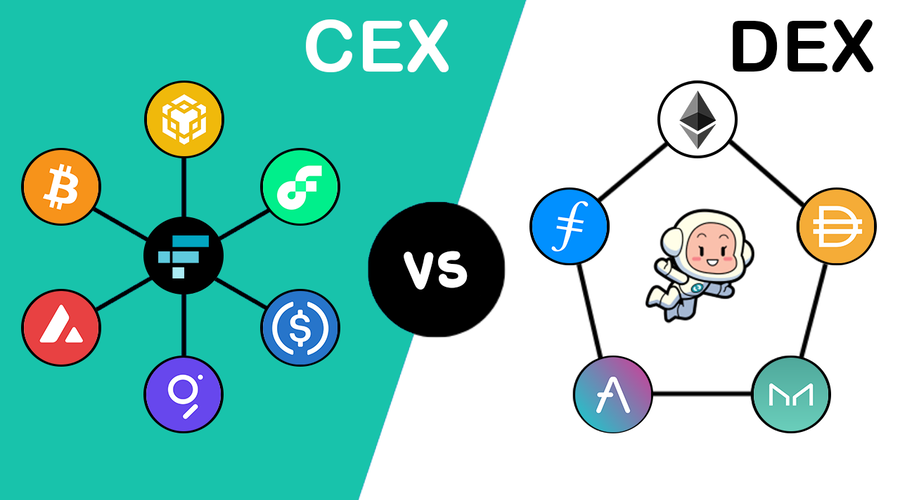Decentralized exchanges (DEXs) and centralized exchanges (CEXs) are two types of cryptocurrency exchanges that allow users to buy and sell cryptocurrencies. While both offer similar functionalities, they operate in different ways and have unique advantages and disadvantages. In this article, we’ll explore the differences between DEXs and CEXs and compare their strengths and weaknesses to help you decide which type of exchange is better for your needs.
Definition and Operation
A decentralized exchange is a peer-to-peer network that allows users to trade cryptocurrencies without the need for a central authority or intermediary. Instead, trades are executed directly between users, typically using smart contracts to automate the process. DEXs are often built on blockchain technology, which allows for trustless, transparent, and censorship-resistant trading.
In contrast, a centralized exchange is owned and operated by a central authority or company, which acts as an intermediary between buyers and sellers. CEXs typically offer more advanced features, such as margin trading, futures, and options, and may support a wider range of cryptocurrencies and fiat currencies.
Security
Security is a critical factor when it comes to cryptocurrency exchanges, as they are often targeted by hackers and cybercriminals. DEXs are generally considered to be more secure than CEXs, as they don’t store users’ funds on a centralized server or database. Instead, users retain control of their private keys and trade directly from their wallets. This makes it much more difficult for hackers to steal users’ funds, as they would need to compromise multiple accounts simultaneously.
On the other hand, CEXs are more vulnerable to security breaches, as they store users’ funds on a centralized server. If the server is hacked, all the funds stored on it could be stolen. However, reputable CEXs implement multiple security measures, such as two-factor authentication, cold storage, and insurance, to protect their users’ funds.
Liquidity
Liquidity is a measure of how easily and quickly an asset can be bought or sold without affecting its price. In general, CEXs tend to have higher liquidity than DEXs, as they have more users, trading pairs, and trading volume. This means that traders can buy or sell cryptocurrencies at a fair price and with minimal slippage.
DEXs, on the other hand, may suffer from low liquidity, especially for less popular tokens or trading pairs. This can result in wider bid-ask spreads and higher slippage, which can make it more difficult to execute trades at a desired price.
User Experience
User experience is another important factor to consider when comparing DEXs and CEXs. CEXs typically offer a more user-friendly interface and more advanced features, such as order book, charting tools, and trading bots. They also provide customer support and often have a mobile app, making it easier for users to trade on the go.
In contrast, DEXs can be more difficult to use, especially for beginners. The lack of a centralized interface and the need to interact with smart contracts can be intimidating for some users. However, DEXs are becoming more user-friendly, with some platforms offering a similar user interface to CEXs and others integrating with popular wallets and apps.
Privacy
Privacy is another area where DEXs and CEXs differ. DEXs offer a higher degree of privacy, as they don’t require users to provide personal information or undergo a KYC (know-your-customer) process. This allows users to trade anonymously and without the risk of their personal information being compromised or misused.
In contrast, CEXs typically require users to undergo a KYC process and provide personal information, such as ID
Regulatory Compliance
Regulatory compliance is an important consideration for both DEXs and CEXs. In some jurisdictions, cryptocurrency exchanges are required to comply with regulations related to anti-money laundering (AML) and counter-terrorism financing (CTF). Failure to comply with these regulations can result in hefty fines or even the closure of the exchange.
CEXs are more likely to comply with regulatory requirements, as they have a centralized entity that can be held accountable. They often have a legal team and work closely with regulatory bodies to ensure compliance. In contrast, DEXs may face challenges in complying with regulations, as they operate in a decentralized and autonomous manner. However, some DEXs have found ways to comply with regulations, such as by implementing a KYC process or restricting trading for certain jurisdictions.
Fees
Fees are another factor to consider when choosing between DEXs and CEXs. CEXs typically charge higher fees than DEXs, as they need to cover their operational costs, such as server maintenance, customer support, and regulatory compliance. They also charge a spread, which is the difference between the bid and ask price, as a source of revenue.
In contrast, DEXs charge lower fees, as they don’t have the same overhead costs as CEXs. Instead, they charge a small transaction fee to cover the cost of executing smart contracts. Some DEXs also allow users to set their own transaction fees, giving them more control over the cost of trading.
Decentralization vs. Centralization
Finally, the main difference between DEXs and CEXs is the level of decentralization. DEXs are designed to be decentralized, with no central authority or intermediary controlling the exchange. This makes them more aligned with the principles of cryptocurrency, such as decentralization, trustlessness, and censorship resistance.
In contrast, CEXs are centralized, with a central authority or company controlling the exchange. This makes them more similar to traditional financial institutions, with all the advantages and disadvantages that come with centralization, such as scalability, efficiency, and accountability.
Conclusion
In conclusion, the choice between DEXs and CEXs depends on your priorities and preferences. If you value security, privacy, and decentralization, DEXs may be a better choice for you. However, if you prioritize liquidity, advanced features, and regulatory compliance, CEXs may be more suitable. Ultimately, both types of exchanges have their strengths and weaknesses, and it’s up to you to decide which one is the best fit for your trading needs.


